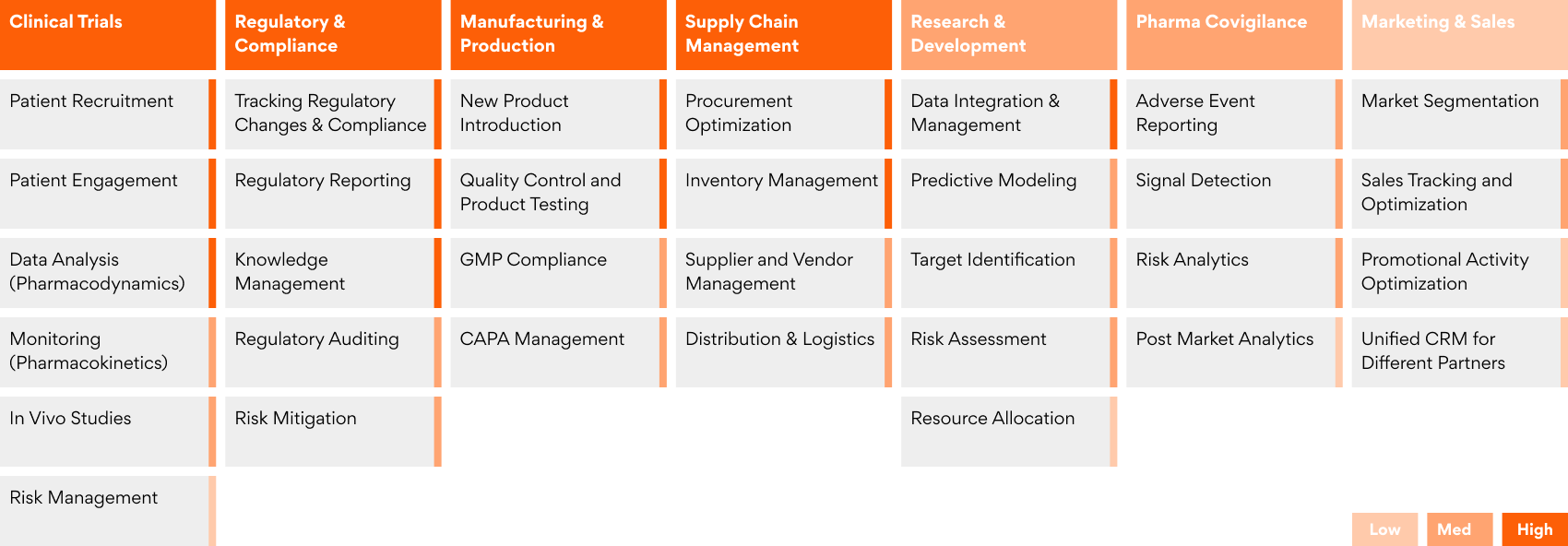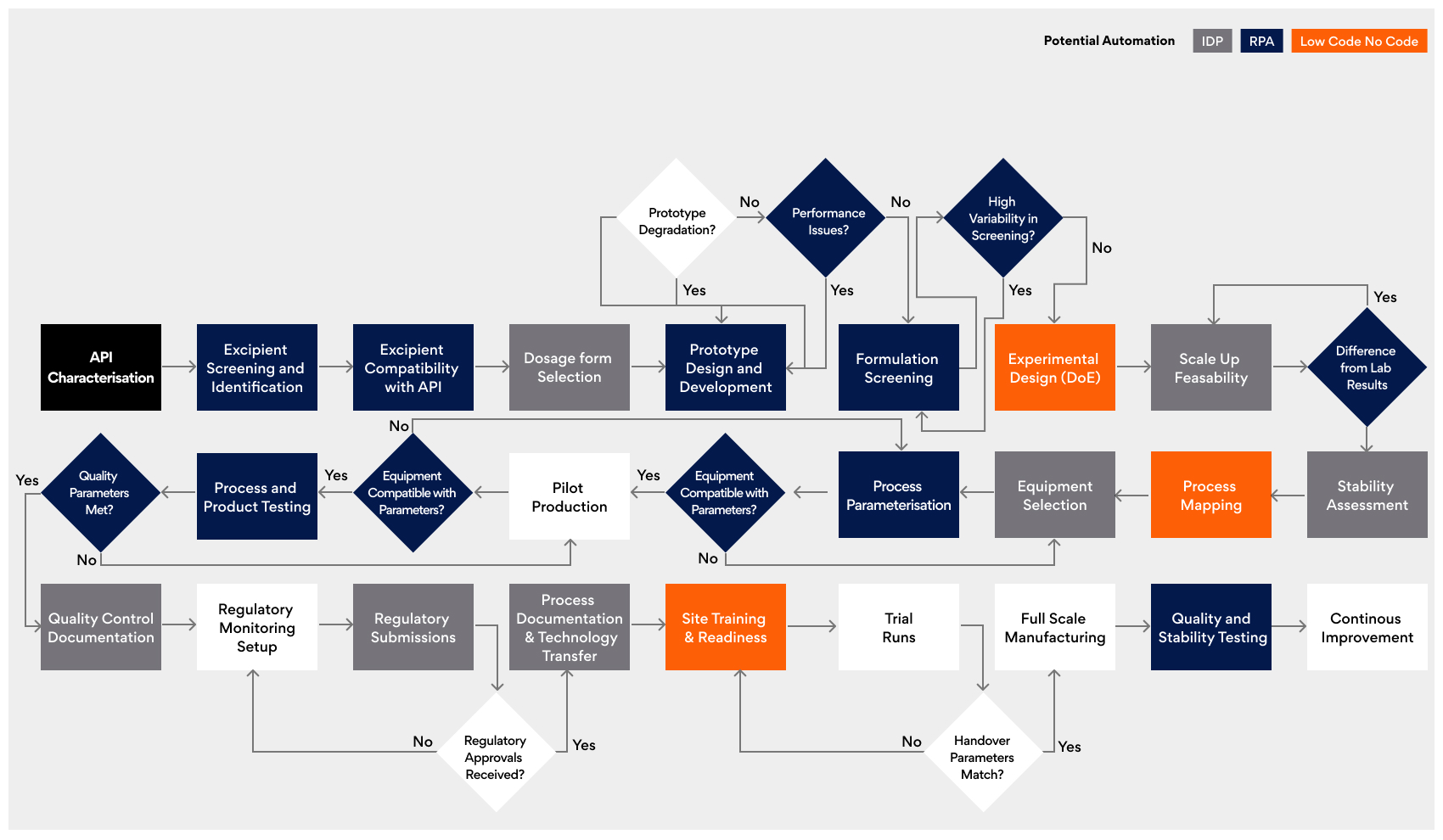The accelerated adoption of digital technologies has transformed the global pharmaceutical and Contract Research Organization (CRO) industries. Digital transformation spending in pharma skyrocketed during the pandemic and is now pegged to reach $4.5 billion by 2030, with significant investments in AI/machine learning (ML), Internet of Things (IoT), and Intelligent Automation (IA). Interestingly, our discussions with pharma and CRO industry leaders reveal that a substantial portion of this investment is being directed at IA, which has become a cornerstone for driving efficiency and innovation.
Even amid economic downturns, IA has proved indispensable by delivering cost savings and operational efficiencies. Beyond these financial benefits, it also plays a strategic role in improving customer and employee experiences, making it an essential tool for the future of pharma.
IA Toolkit for Pharma/CRO
With its suite of available tools, IA enables pharma companies to focus more on innovation while streamlining processes.
- Robotic Process Automation (RPA): By automating repetitive, manual workflows, RPA reduces human dependency, accelerates processes, cuts costs, and minimizes errors.
- Low-Code/No-Code Platforms: These platforms integrate disparate applications, supporting the modernization of legacy systems and significantly reducing the time and steps involved in manual workflows.
- Intelligent Document Processing (IDP): IDP automates the extraction of data from a variety of document formats, speeding up processes across functions like supply chain, regulatory compliance, and manufacturing.
- Virtual Assistants: AI-powered virtual assistants handle a range of queries from employees, partners, and customers, providing accurate information and reducing the need for human intervention.
- Process Mining/Task Mining: These tools help organizations identify which processes or tasks can be automated, offering a clear roadmap to enhance ROI by focusing on the most impactful areas.
Solving Pharma’s Top Challenges with IA
Pharma is an industry characterized by high research costs, regulatory complexity, and vulnerability to supply chain disruptions. IA addresses these core challenges, bringing significant efficiencies across several functions:
- Drug Development: With an average cost of $2.6 billion for new drug development, clinical trials are notoriously lengthy and costly, with a high failure rate . Automation reduces trial times by streamlining patient data retrieval and frees up critical resources by automating repetitive tasks. Generative AI (GenAI)-powered virtual assistants also expedite information retrieval, making the trial process faster and more efficient. Take, for example, a leading CRO with $5 billion in annual revenues that enhanced data search and compilation with automation using a Persistent-built unified portal, reducing search times by 75% and ensuring 100% solution accuracy .
- Regulatory Compliance: Pharma companies face stringent regulatory requirements across regions, often leading to lengthy approval processes, with only 12% of drugs from clinical trials receiving FDA approval. IA can automate the creation and monitoring of compliance reports, while GenAI tools analyze unstructured regulatory documents to reduce time to market and mitigate compliance risks. Persistent assisted a pharmaceutical client with VAT compliance across multiple countries by automating data extraction and reporting, saving more than 2,400 hours of work annually.
- Supply Chain Management: The global, multi-stakeholder nature of pharma supply chains makes coordination costly and complex. IA, through its ability to collect, analyze, and operationalize data, enables more efficient management of suppliers and vendors, reducing the order-to-cash cycle and fulfilment times. Additionally, automation facilitates real-time data tracking from multiple sources, mitigating risks with lower operational costs. Through our IA solutions, one multinational pharmaceutical company reduced its packaging and labeling cycle time by 80%, saving $700,000 annually in shipping costs.
- Patient Recruitment and Retention: Normally, 15 to 40% of patients drop out before the completion of clinical trials, and delays in identifying and enrolling eligible patients become a significant bottleneck. Automation accelerates patient data analysis to identify and recruit the right candidates. GenAI-powered chatbots keep patients engaged during trials, improving retention and reducing dropouts, which directly impacts trial success.
- Data Management and Integration: Inconsistencies in data collection during drug development and clinical trials often lead to missed insights and compromised results. As per a study, 6% of pharma revenue leaks out due to poor data management. IA can help plug leaks by integrating data from various platforms, creating a unified view for decision-makers, and reducing errors. Automated advanced analytics help stakeholders make faster, more informed decisions. For a Fortune 500 pharma company, Persistent reduced data discrepancy resolution time by 40%, manual effort by 80%, and increased time to market by 45% by integrating data from various platforms.
Unlocking High Value Through Intelligent Automation

IA is no longer confined to back-office operations; it is now enhancing core areas of the pharma and CRO industries, including clinical trials, compliance, and drug formulation development. IA has matured to the point where it delivers substantial value in complex processes, leading to greater adoption across the sector.
For example, IA solutions can automate core processes of the pharma value chain, such as formulation development. The solutions, embedded across complex processes, leverage interconnectedness between them to integrate several tasks, reducing the need for multiple steps in processes to reduce overall complexity.
Detailed Workflow: Manufacturing – Formulation Development

GenAI and IA: The Future of Pharma Innovation
GenAI is set to disrupt the pharma and CRO industries, unlocking billions of dollars in value by remodeling core operations. According to the McKinsey Global Institute, GenAI could generate $60-110 billion annually for the pharma and medical products industry by boosting productivity across high-value functions such as drug discovery, clinical testing, and supply chain management.
GenAI offers transformative opportunities in areas like drug target identification, predictive analytics, and Standard Operating Procedures (SOP) creation. It can also optimize supply chains by integrating data from Industry 4.0 technologies, helping pharma companies manage risks and improve logistics.
As IA and GenAI technologies evolve, the pharma industry will continue to discover new opportunities for automation, solving some of its most pressing challenges. Companies will need to recalibrate strategies, retrain employees, and redefine processes to fully capitalize on these advancements. Those that adapt quickly will reap the rewards of increased efficiency, innovation, and long-term growth.
Contact us today to explore our GenAI and IA-tailored solutions that drive efficiency, innovation, and growth in the pharma and CRO industries.








